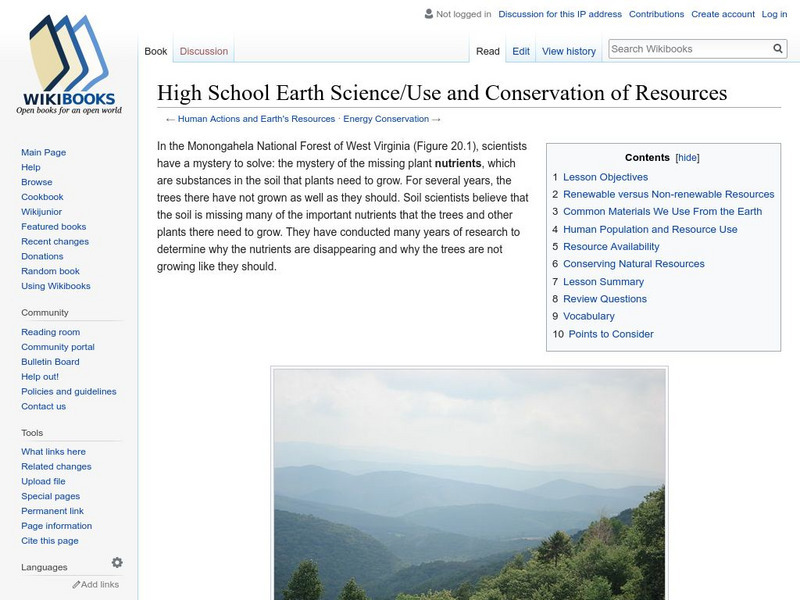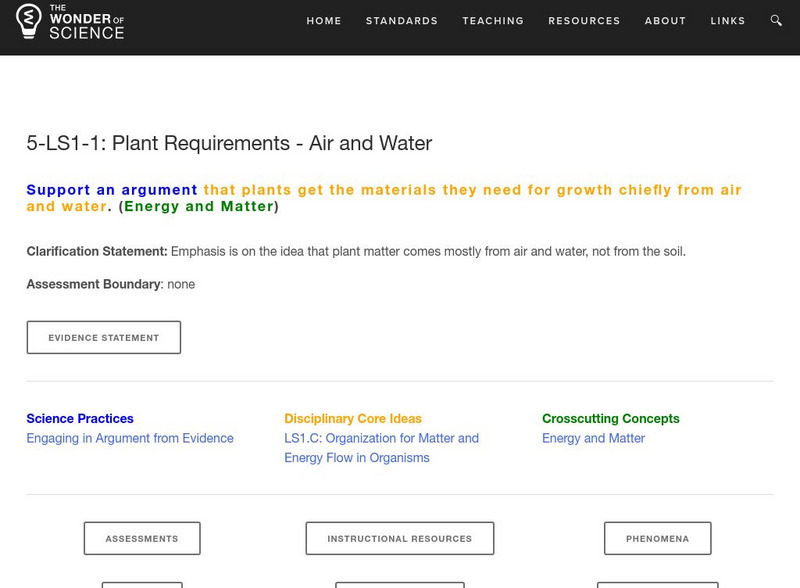Curated OER
Do You See What I See?
Second graders view a teacher-created terrarium, and complete a KWL chart. They discuss what they can see, Students go on a nature walk and compare the schoolyard to the terrarium, discussing the roles of rocks, plants, soil, and water...
Curated OER
Get Nutty
Students research how nuts and seeds contribute to their overall good health.They recognize that nuts and seeds are a tasty addition to a meal. Students comprehend that nuts and seeds pose a risk for a small proportion of the population...
Curated OER
Goobers. Goobers? Goobers!
Students begin the lesson by noting the many ways in which to use peanuts. In groups, they use the internet to research the work of George Washington Carver. They discover the allergies and nutritional information of the peanut and...
Curated OER
Influence of Geography on the Migration of Virginians
Sixth graders study how geography influenced the westward migration of Virginians. They review the settlement patterns of early Virginians before discussing reasons why people move away from an area. Looking at maps, they determine how...
Curated OER
Water Quality Monitoring
Students comprehend the four parameters of water quality. They perform tests for salinity, dissolved oxygen, pH and clarity or turbidity. Students comprehend why scientists and environmental managers monitor water uality and aquatic...
Curated OER
Compost Tag
Students identify biodegradable items. In this environmental lesson plan, students participate in a game of tag. A student's name is called out along with a biodegradable item and the student is tossed a ball.
Curated OER
The Three Sisters: Corn, Beans and Squash
In this Thanksgiving worksheet, students read a short passage about Thanksgiving. Students are provided with a list of materials that can be used as supplemental reading for the same subject.
Other
Nutrients for Life Foundation: For Teachers: Nourishing the Planet
Download free curriculum with three modules on soil and plant science: elementary, middle, or high school. Each module includes hands-on investigations to help learners understand the importance of healthy soil and thriving plant...
Other
Nutrients for Life Foundation: For Teachers: Nourishing the Planet
Download free curriculum with three modules on soil and plant science: elementary, middle, or high school. Each module includes hands-on investigations to help learners understand the importance of healthy soil and thriving plant...
NOAA
Noaa: Estuaries 101 Curriculum: Nutrients in an Estuary
An overload of nutrients, called eutrophication (Greek for "good-nutrition"), can be harmful to estuaries. This phenomenon is also referred to as "over-enrichment," or "nutrient pollution". Students will investigate the range of...
Other
Wikibooks: High School Earth Science/use and Conservation of Resources
Begins with a description of a case of missing plant nutrients that have been affecting Monongahela National Forest in West Virginia. Lists some of the benefits to humans of the natural resources in such a park. Then explains the...
Ministry of Education, Sports & Culture (Samoa) Government
Mesc: Samoa School Net: Nutrients
A 2-part learning module on nutrition. Looks at what kinds of nutrients our bodies needs and what foods to eat to get them. Stresses that the healthiest diet includes mostly plant produce.
Other
Kids World : Plant Nutrition
Plants need certain nutrients to grow well. Use this site to find out what plants need, how to care for them, how to read a fertilizer label, and do the fun activities, like a quiz, a puzzle and a coloring book.
Ohio State University
Ohio State University: Concepts of Plant Ecology
An advanced discussion of plant interactions and relationships. Energy flow, nutrient cycling and succession are discussed. Try the quiz to check your understanding.
Alabama Learning Exchange
Alex: Field Challenge Strategy Game
Lesson plan describing a strategy game where students use flags in a large field to mimic the growth and spread of trees, grass, and shrubs. Rules for game include how trees, grass, and shrubs interact to compete for sunlight, nutrients,...
The Wonder of Science
The Wonder of Science: 5 Ls1 1: Plant Requirements: Air and Water
Create lessons to show that plants use air and water primarily to grow with help from the resources on this site. Use the work samples, phenomena, assessment templates, and videos to help students understand the requirements of plants to...
BiologyWise
Biology Wise: Uses of Potassium
The uses of potassium as a human nutrient, a plant nutrient, and in different industries are described.
Science Education Resource Center at Carleton College
Serc: Habitat Part 2
This activity is designed for students to examine soil and determine which soil will be the best for plant growth. The students will also investigate the effect of sunlight on plants and the importance of sunlight in producing chlorophyll.
NC State University
Ncsu.edu: Adventures of the Agronauts
This site is an online science curriculum on how to grow plants on the Moon. There are six lessons that have a glossary also included. There are movies that demonstrate concepts, and teacher resources. The sites topics cover, the Earth,...
Royal Botanic Gardens
Plant Cultures: Sandalwood Trees
Did you know that sandalwood trees are semi-parisitic? They tap into the nutrient supply of nearby plants. You will find other interesting facts about sandalwood trees in this informative site.
ClassFlow
Class Flow: Plant Life
[Free Registration/Login Required] This flipchart explains what resources plants need to grow, the parts of a plant, a word search, and questions to use with the Activotes.
Scholastic
Scholastic: Study Jams! Science: Plants: Roots and Stems
A looping slideshow on the structures that make up the roots and stem of a plant, and the functions they perform. Includes a multiple-choice quiz.
BiologyWise
Biology Wise: Structure and Function of a Casparian Strip
The Casparian strip is found in the endodermis layer of a plant's roots and it assists the plant in absorbing water and nutrients from the soil. The structure of a plant root is described and the process by which the Casparian strip...
PBS
Pbs Teachers: Soil in the Amazon
Compare plants grown in simulated Amazon soil to those grown in soil prepared by the slash-and-burn method. Describe leaf development in plants grown in different soils and chart, average and graph plant growth by height



















